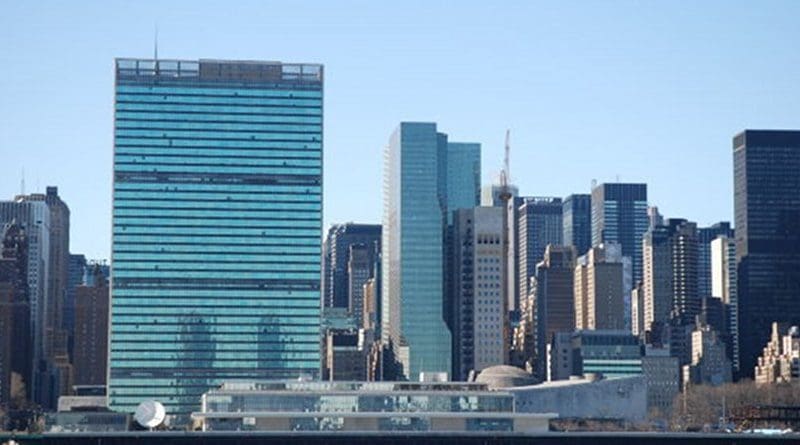Eastern Europe Must Grasp Its UN Moment – OpEd
By Miodrag Vlahovic*
The Brexit referendum has seriously damaged the basis of the EU’s structure and has upset the applecart of European politics in general.
This seismic event will overshadow all political developments in Europe for the immediate future (and for years to come, too), while European leaders fixate on the very concept and perspective of the EU.
This is understandable, but Europe risks ignoring its international responsibilities during a pivotal year which includes the election of the next UN Secretary-General. This is a key international role which needs Europe’s attention, despite the oppressive and challenging post-Brexit agenda.
Governments from Eastern Europe, the only region never to have held this position, put forward eight nominees to compete for the position including Mr Igor Luksic, the former Prime Minister and Foreign Minister of Montenegro, my home country.
After a series of public hearings at the UN General Assembly in April, the candidates set out their platforms for a new UN. Their campaigns to secure the support of the Security Council members are underway and July’s first round of discussion should thin this field of candidates leaving those serious contenders.
As a Montenegrin, I am proud to see Mr Luksic representing our country and giving a positive vision for the UN. Igor runs a very interesting campaign, being very active in presenting his ideas and proposals at all relevant international and diplomatic addresses.
It would be a stunning achievement for our country our candidate to hold the position of UN Secretary-General. But even if this does not occur, the very fact that Montenegro has a serious contender is a very important fact for the country which became a UN member only in 2006.
Among all criteria which may be of interest for the UN members, there is a strong international movement to elect for the first time a woman Secretary-General. That element in the complex election puzzle should not be ignored. The global trend in this aspect will have its impact on world organisation, also.
That is why I find myself among those who believe that Bulgaria’s official candidate, Mrs Irina Bokova, the current head of UNESCO and previous acting Foreign Minister, would be most probably the best chance for Eastern Europe to get this position.
She has strong UN and diplomatic credentials and a solid track record. She was twice elected as Director-General of UNESCO meaning she is trusted by the Member States and has good working contacts with practically all UN members. She also successfully overhauled the organisation in the face of budget constraints. These are all very important elements to be taken into account.
As with any election, there are backroom negotiations reported. The most interesting case happens to be the situation with Bulgaria’s Kristalina Georgieva, current European Commissioner for Budget and Human Resources. Mrs Georgieva failed to gain her own country’s support earlier this year, but she has been trying to secure the nomination from other countries, namely Hungary and Albania.
It seems obvious that Mrs Georgieva is not only acting against the interest of her own country, but also against the very interest of Eastern Europe in general. The common position of Eastern Europeans is less likely to occur if, instead of harmonising the opinions of all countries involved, we face the situation that candidates are nominated by other governments than their own. Confusion and potential for disputes would be obvious and cannot be ignored.
This is exactly how a senior member of the European Commission member should not behave, especially not in post-Brexit times.
Last week, the Albanian Foreign Ministry announced that its government would not nominate Georgieva. This would have been too problematic, obviously. There will not be any surprise if Hungary does the same.
The eyes of the world are on Eastern Europe for a positive reason. It should stay like that. As a region, we must be smart and look to the benefits of this diplomatic race for our common good. We must find our way to support our strongest candidate.
If we revert to the stereotypical politics of misunderstanding, confrontation and conflict, we will turn inwards and reject our place on the global stage. This would be non-intelligent and we could risk losing our historic opportunity for international leadership to a Latin American candidate, per example. Other UN members have seen the window of opportunity there and candidates have emerged from Argentina, New Zealand, Portugal and possibly even from Costa Rica or Mexico.
This will certainly be Eastern Europe’s only chance to have a UN Secretary-General for years to come. The two-term mandate of the post is an un-written rule. We can make a positive mark on the world by supporting a relevant and strong candidate who has the best chances to lead the UN.
Eastern Europe can provide this person – but only if we come together, understanding the necessity to rise above our differences and do what is best for our region as a whole. After the July 21 straw poll, we will need to regroup as a region, and identify our common strategy for the future.
Seventy years after the creation of the United Nations and over 25 years after the fall of the Berlin Wall, it would be a landmark historic achievement for Eastern Europe to provide its first Secretary-General of the UN.
If we have the ‘obligation’ of addressing the newly-elected person as ‘Madame Secretary-General’ – even better!
*Miodrag Vlahovic was Minister of Foreign Affairs of Montenegro and the first Montenegrin Ambassador to Washington.

